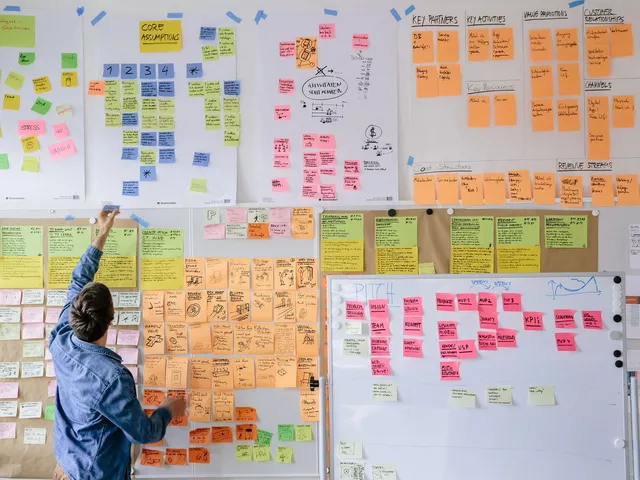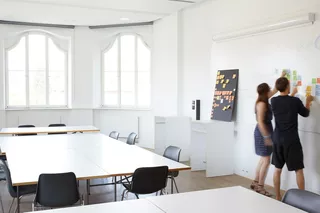Strategic Design: Design, Management and Research

Design is understood here as in addition to attaining financial success, also pursuing social progress toward improved living situations for people. In other words, strategic design, that influences social developments and challenges of the future. This requires knowledge of cultural and social science. The master’s program at the HfG, Schwäbisch Gmünd provides you with these skills in a project-based, interdisciplinary and application-oriented manner.
Profile
Interdisciplinary
The often so strict separation between product, communication and interaction design previously is now increasingly disappearing. We, therefore, focus on an interdisciplinary approach. With us you optimize processes, invent services, develop business models, create communication concepts, keep an eye on different media, research user behavior, get rid of products and design new ones. In doing so, you use approaches and methods from other disciplines such as economics, sociology, rhetoric and futurology.
Cooperative
Together we are smarter. That’s why you work on your projects in teams. We cooperate with numerous institutions from science and technology, business, education and culture. The HfG enjoys a very good reputation and the students also benefit from this. Some of us develop our final thesis in cooperation with a company. Our lecturers work in business and know exactly what demands are made on us in practice – they prepare us for this and we benefit from their experience and knowledge of the industry.
User-centered
None of us revolve around ourselves. What we do, we do for other people. That’s why, in strategic design, we first listen carefully to what people are occupied with and what their needs are. This is valuable and can also shake you up because sometimes it means that you have to leave your own ideas behind. Later, in the design process, it is also important to get feedback from users – positive and negative feedback. After all, this is how we increase the quality, relevance and cost-effectiveness of our products.
Course Content
How is information and knowledge organized and used in a useful way? Which mobility systems and which services will we need in the future? Which products and processes can make human life easier and better in a complex and resource-limited society?
-
Focus on Design
In the master’s program, you learn to expand the skills you acquired in the BA in larger and interdisciplinary design projects. The repertoire of design methods will be enriched with theoretical knowledge from design research and cultural studies. You will optimize the work on projects with new analysis and planning tools. The design work is seen here as the result of a process that goes far beyond the classical design process itself. Students acquire strategies and design methods that demand consideration of sociological, economic and cultural issues. In this way, problems are viewed in an comprehensive way and design solutions are conceived as a holistic process.
-
Focus on Management
The curriculum aims at the acquisition of process and project management methods. This includes both strategic as well as operational management. This content is directly linked to the design projects: you test the management and planning strategies on your design projects. Management refers not only to corporate contexts, but also to concept-driven and problem-oriented design processes and solutions.
-
Focus on Research
The research concentration involves scientific methods and developing research questions. In addition, you will deal with the current status of design research as well as concepts from related scientific fields such as cultural studies. The area of publishing as part of scientific work is also covered. Both theoretical knowledge and methodological skills are applied in the design projects. Within the elective area you can set your own focus areas.
Course of study
In the first two semesters you will take courses in all three fundamental areas – design, management and research. Starting in the first semester you will test methods and processes of design in a strategic design project. Findings from the accompanying courses are integrated into the project. In strategic management you will receive an introduction to the basics of strategy development and formulation. Scientific methods as well as the theoretical examination of questions of cultural studies and design research round off the program of the first semester.
In the second semester, you will also work on a design project, focusing on planning and organization as well as communication strategies. In addition, courses on „Operational Management“ are offered. In the research module, you will delve into questions of design research. You will also learn techniques of scientific work and publication strategies.
The third semester is dedicated to the master’s thesis. This can consist of a design project and a written scientific-theoretical elaboration. The thesis is usually written in cooperation with external project partners from research, universities and companies, i.e. with a high scientific or professional relevance. After successful completion of the three semesters, you will receive the internationally recognized Master of Arts degree.
Learning objectives of the program
The master’s program expands the design-related skills you acquired in the bachelor’s program to include scientific and economic skills. The professional field of the designer has changed massively in recent years: Today, designers are increasingly designing processe- be it control tasks in companies, sustainable services or complex or transmedial communication tools. What these fields have in common is the „classic“ separation between product, communication and interaction design which are becoming increasingly blurred in professional life. Therefore, the master’s program aims less at specialization in a particular discipline, but more at training designers who work in a superordinate and interdisciplinary way and act as mediators and communicators.
You will learn team leadership skills, the multi-perspective view of problems and the analytical work on solutions. Furthermore, you know the socially and ecologically responsible role of the designer. You are familiar with the conditions and consequences of design-led action and learn to influence design thinking and action in cultural, administrative and economic contexts. You are also able to work on research tasks in design and to use evaluation methods to optimize processes.
Cooperation with other universities, research institutes, institutions and companies creates understanding for the input of powerful expert groups and shape communication and team skills.
Supervision and equipment
Professors and lecturers of communication, product and interaction design as well as cultural and economic sciences will personally supervise you at our university. In addition, top-class experts from industry and research are available to you as lecturers. Design and scientific expertise are on an equal footing with practical support from external project partners from the business world.

These are our projects in Strategic Design
At the HfG, Schwäbisch Gmünd the focus is on project work – also in the Master’s program. In the first semester, we carry out a large design project. In addition, there is a wide range of seminars and workshops in which we deal with scientific and economic topics; coaching for personality development is also included. In the second semester, you prepare your master’s thesis, which you then work on in the third semester.
Here’s where we work
Strategic designers are versatile. We are professionals in thinking holistically and unusually. That’s why we are particularly sought after when it comes to interface tasks. With our design Master we find our place in large companies, in specialized design offices, in research institutions and in cultural institutions. We optimize business processes, develop long-term visions, improve the cooperation of different disciplines and promote the innovative spirit. The degree course also qualifies us for a doctorate. It depends on your interests.
„In addition to teaching, I am involved with design research and my doctorate work.“
„I deal with the conception and facilitation of design thinking and co-creation workshops. I also create tools and experience maps.“
„I oversee trade fairs and the website. I also create films and am responsible for the employee magazine and areas of corporate communications.“
„Together with my colleagues from different departments, I develop the operating concepts for the vehicles of tomorrow.“
„I develop business models for the energy supply and infrastructures of tomorrow. Above all, I am responsible for a deep understanding of the customer. “
„As the only designer in an interdisciplinary team, I am required to use my expertise in a wide range of areas, for example in the conception, planning and design of digital communication measures.“
Your Master Studies at the HfG!

Ask Us
Any questions? Then contact our degree program coordinator for Strategic Design: